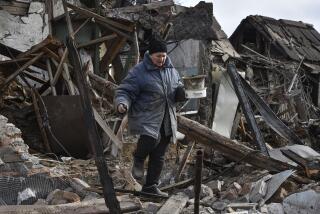U.S. Steps Up Raids From Turkish Base : Air war: Many fear the country will be the target of retaliation. U.S. dependents abandon the Incirlik base.
ANKARA, Turkey — U.S. air strikes against Iraq from Turkey intensified Sunday as families of American fliers abandoned the big Incirlik Air Base that launches them. The Turkish government, meanwhile, sought to calm a bad case of national war jitters.
Reports of three big new raids, raising to at least six the number of missions flown from Turkey since Friday, came from Turkish and foreign reporters camped around the perimeter of the NATO base near the southern Turkish city of Adana, 460 miles from the Iraqi border.
The reporters count and photograph the jets--between 30 and 40 aircraft per mission--as they leave laden with bombs and rockets, and they repeat the process when the planes return a few hours later, their ordnance gone. On an afternoon raid Sunday, 36 aircraft departed but only 35 returned, the reporters said, in what may have been their last account. Turkish troops chased them away from their lookouts Sunday night.
According to Turkish newspapers, two waves of American fighter-bombers on Saturday attacked artillery and antiaircraft emplacements in mountains not far from the frontier.
Maj. Michael Maher, a spokesman at Incirlik, said most civilian dependents had left the base “on a voluntary basis,” to return to the United States. Diplomatic sources, though, said the dependents, who had been leaving in small numbers as war approached, were encouraged to leave, principally to make room for new military arrivals. The heavily guarded installation’s personnel strength has grown from 3,000 to nearly 4,000 Americans.
In the last week, 48 American combat aircraft have joined an equal number on alert at Incirlik since the gulf crisis began. In addition, U.S. officials acknowledge that Incirlik also now houses AWACS command aircraft, refueling tankers, search-and-rescue planes and helicopters, an expanded number of cargo planes and a Patriot anti-missile battery.
Residents of the Turkish border town of Silopi told Turkish reporters Sunday of hearing repeated explosions on the Iraqi side of the Tigris River frontier. About 100,000 second-line Iraqi troops on the frontier face a Turkish army that some Turkish sources say has swelled in recent days to 180,000 men.
When a bomb fell harmlessly into a field near the Turkish border village of Cizre, the Turkish general staff quickly asserted that it had fallen from a Turkish jet on a training mission. No Turkish jets have flown outside Turkish territory, a spokesman said.
Turkey has authorized the use of Incirlik for U.S. raids. Bush Administration officials have privately confirmed the raids, but neither Ankara nor Washington officially acknowledges them. Turkey’s role as springboard for second-front attacks against Iraq has triggered widespread fear of Iraqi retaliation: Several hundred thousand people have fled their homes in the Turkish southeast.
“We have authorized the Americans to make more extensive use of the bases. It is the government’s decision not to reveal details,” said Foreign Ministry spokesman Murat Sungar.
For its part, a preoccupied Iraq showed signs Sunday that it was accepting Turkey’s no-raids fiction, thereby avoiding any need to respond to them.
Iraq’s ambassador to Turkey, Rafia Mujwel Takriti, assured the Turkish newspapers Milliyet and Gunes that Iraqi President Saddam Hussein “is appalled” about speculation of a possible Iraqi attack on Turkey. “He has never considered sending missiles to Turkey,” the ambassador told Gunes.
To Milliyet he noted: “Israel is our enemy, and the Saudi Arabian situation is clear. Turkey is our brother. . . . We haven’t done anything against Turkey. There is no such thing in our leader’s thought.”
Beyond fear of attack, many Turks, including most prominent commentators and all opposition political parties, warn that use of Incirlik could drag Turkey into the war. The end of a long and prized tradition of nonintervention in Middle Eastern disputes will complicate Turkey’s role in the region for years to come, they say. Opposition deputies stalked from Parliament over the issue Saturday.
President Turgut Ozal, architect of Turkey’s unstinting support for the United States, has repeatedly promised that Turkey will not become directly involved in the war.
On Sunday, it was the turn of Prime Minister Yildirim Akbulut to reassure a nervous nation. “We do not expect an attack from Iraq because they don’t really have the possibilities,” he said. “It would not be rational. . . . I ask my citizens not to be anxious.”
Although Turkish newspapers detail Incirlik’s war role, state-controlled radio and television is mute. Twice on Sunday, when Cable News Network broadcasts being transmitted live on Turkish TV began mentioning Incirlik, the government television station broke away, transmitting nature films until it was judged prudent to return to CNN.
More to Read
Sign up for Essential California
The most important California stories and recommendations in your inbox every morning.
You may occasionally receive promotional content from the Los Angeles Times.










